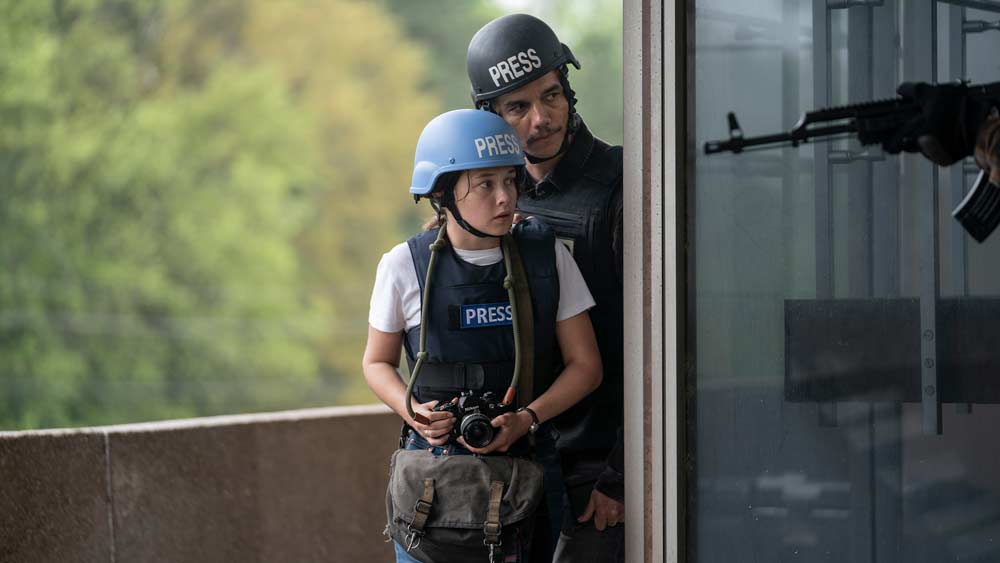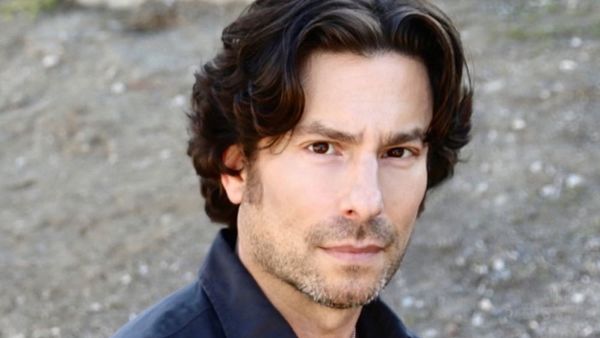Apr 11
Review: 'Civil War' a Harrowing Road Trip Through a Collapsing America
Derek Deskins READ TIME: 4 MIN.

A film depicting a modern civil war in a time when the media is constantly reminding us of how polarized and divided the U.S. population is feels designed specifically for someone like Alex Garland to bring to the screen. But as Garland is wont to do, his "Civil War" is not some political thriller concerned with the machinations of its existence, but instead a contemplation of the horrors of war and those determined to see it through.
Lee Smith is a celebrated photojournalist that has been thoroughly hardened by the trials of her chosen profession. She walks amongst the rubble and corpses of a collapsing United States with the purpose of documenting the atrocity. Along with her colleague, Wagner, the duo is determined to achieve the impossible: interview the dictatorial President of the United States before this all ends. With some expectation of the suicidal nature of their mission, Lee is loathe to invite anyone else along. But Wagner's penchant for company loops in their aging mentor, Sammy, and an aspiring photographer, Jessie. Now with a full car, the foursome sets out on a road trip from hell.
Despite what you may expect, Garland has no interest in getting into the politics of our current reality or what could have inspired his fictitious civil war. He says as much in the presentation of the warring factions of this United States, the largest of which is an alliance of California and Texas dubbed the Western Forces. It is in this pairing that Garland tacitly indicates that he is not trying to answer, or even really entertain, the questions that you have. This is his story to tell and that is one of bloodshed and determination. This decision may frustrate some, but in execution "Civil War" is all the better for the choice.
In structure, "Civil War" is designed like many other road trip movies. After the group assembles, we are taken through a series of vignettes/stops in which the group is forced to reckon with their surroundings and reveal their inner truths and the truths of their world. The structure propels the film forward volleying between chaotic combat and quieter respites to allow the audience into the minds and motivations of the central group. The film flourishes in both of these setups, although it is clear that Garland finds the most opportunity in those punctuated by gunfire and tension.
Garland's depiction of war is harrowing and overwhelming. His focus on the press' role in documenting warfare shoves the audience into the action without any of the context. It is disorienting and knocks the viewer on their heels. It draws you closer to the screen in constant fear and uncertainty as to what may happen. For the majority of the film, from our perspective, there is no plan other than survival. The exception to this may be the film's most insane sequence in the storming of the Capitol. The final siege of Washington, D.C. is as good a battle scene as has ever been put on the screen. It is an ordeal that you cannot catch your breath throughout while never losing its ability to deliver action coherently.
Despite the strength of Garland's action direction and a cast that never quits delivering, "Civil War" doesn't feel like a complete win. A movie can be successful with a thin plot, however Garland also draws his characters with little shading. While they do grow through their shared trauma, it is merely by degrees. Perhaps that's the point, for we cannot realistically expect individuals who have lived with atrocities for so long to change quickly, but I yearned to know them better, or at the very least be given more before both Lee begins to set and Jessie rises in the film's final moments.
While Garland's "Civil War" is not a movie about the reason for such a war, it is a successful and difficult picture on the complexities of war itself. While Garland always battles with big ideas and complex, often unanswerable questions, he is far more grounded in this film resulting in something that may strangely have greater mass appeal than "Men" or "Annihilation." Under his direction, "Civil War" is less a movie to be enjoyed and more one to be endured. It leaves you with sweaty palms and a pounding heart, but that's the point. War is awful and during it the "why" can be lost, leaving the people in it to contend with the "what" and "how." Alex Garland asserts that a dying soldier on the battlefield doesn't cling to the politics of his situation, but instead to a hope for survival. "Civil War" reminds you that no matter the politics of its existence, in war people die, and to forget the horror of death is to forget the reason for living.
"Civil War" opens in theaters on April 12.




